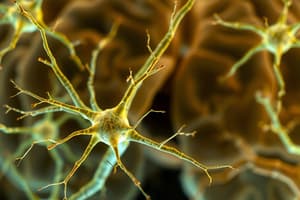Podcast
Questions and Answers
Which type of glial cell is responsible for producing myelin in the central nervous system?
Which type of glial cell is responsible for producing myelin in the central nervous system?
- Schwann cells
- Astrocytes
- Microglia
- Oligodendrocytes (correct)
What is the primary role of neurotransmitters in the nervous system?
What is the primary role of neurotransmitters in the nervous system?
- To insulate axons
- To transmit signals between neurons (correct)
- To transport ions across the membrane
- To create action potentials
What term describes the gap between two neurons where neurotransmitters are released?
What term describes the gap between two neurons where neurotransmitters are released?
- Axon terminal
- Synapse (correct)
- Dendrite
- Soma
Which of the following statements about neurons is true?
Which of the following statements about neurons is true?
What effect do agonistic neurotransmitters have on neurons?
What effect do agonistic neurotransmitters have on neurons?
During the resting potential, how is the inside of a neuron charged relative to the outside?
During the resting potential, how is the inside of a neuron charged relative to the outside?
Which of the following is NOT a common role of glial cells?
Which of the following is NOT a common role of glial cells?
How do neurotransmitters cease their action in the synapse?
How do neurotransmitters cease their action in the synapse?
Flashcards are hidden until you start studying
Study Notes
Nervous System Overview
- The nervous system comprises a complex network of cells responsible for transmitting information throughout the body.
- Neuroscience studies the brain's structure and the components of the nervous system.
Neurons and Neurotransmitters
- The brain is made up of neurons and glial cells; glial cells provide essential support and communication for neurons.
- Glial Cells:
- Offer physical and metabolic support.
- Some possess stem cell-like properties, aiding in repair and maintenance.
- Neurons:
- Specialized cells that transmit messages within the nervous system.
- Have unique structures: dendrites, soma, axon, and axon terminals.
- Oligodendrocytes myelinate axons in the central nervous system, while Schwann cells myelinate in the peripheral nervous system.
- Neurons maintain a resting potential, which is an electrical charge at rest, and can fire an action potential when stimulated.
- Action potentials result from a shift in ion balance across the neuron membrane, which is semipermeable.
Myelin and Neural Transmission
- Myelin serves to insulate axons, enhancing the speed of electrical signal transmission.
- The firing of neurons is an all-or-none response, contingent on the sum of excitatory and inhibitory signals received.
- Neurotransmitters (NTs) travel across the synapse and bind to receptor sites on adjacent cells, acting as agonists (excitatory) or antagonists (inhibitory).
- The action of NTs is terminated either by reuptake into the releasing cell or breakdown by enzymes.
Practice Quiz Insights
- The axon is the part of the neuron responsible for carrying messages to other cells.
- Generating action potentials is not a function of glial cells.
- During a neuron's resting potential, the inside of the neuron is negatively charged.
- Neurotransmitters traverse the synapse, a fluid-filled space, to reach the next dendrite.
- Black widow spider venom mimics acetylcholine effects, acting as an antagonist.
- Endorphins are associated with pain relief.
Brain Anatomy
- The appearance and function of brain tissue can vary significantly when examined in situ within the skull.
Studying That Suits You
Use AI to generate personalized quizzes and flashcards to suit your learning preferences.




